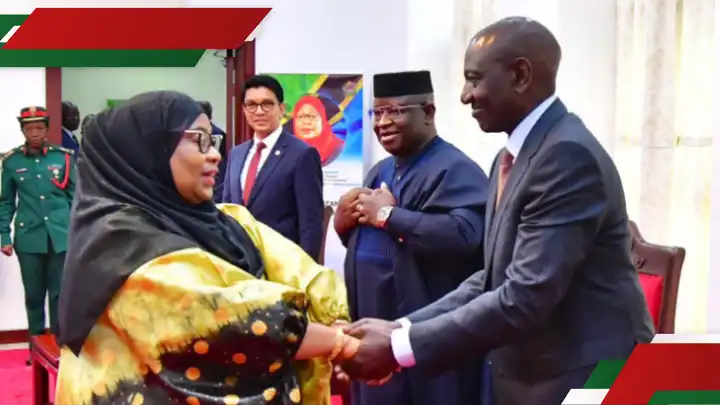Kenyan president apologises to Tanzania over deportation row
Share
We look our best in subdued colors, sophisticated cuts, and a general air of sleek understatement. When I was young, I lived like an old woman, and when I got old, I had to live like a young person.
We launched Lenses over a year ago as a whole new way to express ourselves on Snapchat. Since then, we’ve become puppies, puked rainbows, face-swapped with our best friends — and begun to explore how Lenses can change the world around us.
Kenya’s President William Ruto has publicly apologised to Tanzania following days of tension between the neighbouring countries.
Some Kenyans on social media have been targeting Tanzania’s President Samia Suluhu Hassan following the recent detention and deportation of prominent East African activists.
Angry Tanzanian MPs on Monday accused Kenyans of cyberbullying and disrespecting Tanzanian sovereignty and “meddling in domestic affairs”.
Speaking at a national prayer breakfast on Wednesday, Ruto appeared to extend an olive branch to Tanzania.
“To our neighbours from Tanzania, if we have wronged you in any way, forgive us,” he said.
“If there is anything that Kenyans have done that is not right, we want to apologise,” the president added.

Among them were Kenyan Boniface Mwangi and Agather Atuhaire from Uganda.
The two said they were held incommunicado for several days and tortured, before they were left at the border by Tanzanian security forces, sparking widespread condemnation across the region and from international rights groups.
Tanzania is yet to comment on the torture claims but President Samia had earlier warned that she would not allow activists from neighbouring countries to “meddle” in her country’s affairs and cause “chaos”.
Both Kenya and Uganda had formally protested against the detention of the activists, accusing the Tanzanian authorities of denying consular access despite repeated requests.
The alleged mistreatment of the activists triggered an online war, with social media users from Kenya and Tanzania clashing over the claims.
In a heated debate on Monday, Tanzanian parliamentarians expressed outrage over the young Kenyans trolling President Samia.
The MPs said Samia had every right to defend Tanzania’s national interests.
The legislators’ comments angered some Kenyans who hit back by sharing lawmakers’ contacts and flooding their phones with messages to express their disapproval.
Tanzania’s Iringa Town MP Jesca Msambatavangu said that most of the messages came via WhatsApp, forcing her to temporarily switch off her phone.
Msambatavangu, however, welcomed the engagement, encouraging Kenyans on social media to “counter ideas with ideas”.
She asked young Kenyans to create a WhatsApp group for further engagement and promised to engage them in a live session on Saturday.
“Kenyans are our neighbours, our brothers, and we cannot ignore each other,” she added.
“To our neighbours from Tanzania, if we have wronged you in any way, forgive us,” he said.”
Paul Dudley White
Among them were Kenyan Boniface Mwangi and Agather Atuhaire from Uganda.
The two said they were held incommunicado for several days and tortured, before they were left at the border by Tanzanian security forces, sparking widespread condemnation across the region and from international rights groups.
Tanzania is yet to comment on the torture claims but President Samia had earlier warned that she would not allow activists from neighbouring countries to “meddle” in her country’s affairs and cause “chaos”.
Both Kenya and Uganda had formally protested against the detention of the activists, accusing the Tanzanian authorities of denying consular access despite repeated requests.
The alleged mistreatment of the activists triggered an online war, with social media users from Kenya and Tanzania clashing over the claims.
In a heated debate on Monday, Tanzanian parliamentarians expressed outrage over the young Kenyans trolling President Samia.
The MPs said Samia had every right to defend Tanzania’s national interests.
The legislators’ comments angered some Kenyans who hit back by sharing lawmakers’ contacts and flooding their phones with messages to express their disapproval.
Tanzania’s Iringa Town MP Jesca Msambatavangu said that most of the messages came via WhatsApp, forcing her to temporarily switch off her phone.
Msambatavangu, however, welcomed the engagement, encouraging Kenyans on social media to “counter ideas with ideas”.
She asked young Kenyans to create a WhatsApp group for further engagement and promised to engage them in a live session on Saturday.
“Kenyans are our neighbours, our brothers, and we cannot ignore each other,” she added.
We did, however, make a change to the way we operate our business in London. Going forward, we will bill our advertising revenue from the U.K. (and a few other countries).
You Might also Like




